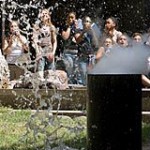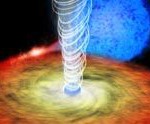Category Science & Technology
Curiosities: How well do dogs see at night?
A lot better than we do, says Paul Miller, clinical professor of comparative ophthalmology at University of Wisconsin–Madison. “Dogs have evolved… Read More
WLS: The long-term study that almost wasn’t
It's now one of the longest social science investigations ever. Yet, at the beginning, the Wisconsin Longitudinal Study (WLS) wasn't meant to last. Read More
Recent sightings: Science learning with a big bang
A group of high school students from the univeristy’s Pre-college Enrichment Opportunity Program for Learning Excellence (PEOPLE) react to the big… Read More
Study finds variable drug sensitivity among hepatitis C viruses
A new study from the University of Wisconsin–Madison School of Medicine and Public Health offers promise for a double-duty treatment that may provide both immune suppression and anti-HCV activity in a single drug. Read More
Catching the insect bug: Insect Ambassadors spread their fascination with the six-legged world
When he was in seventh grade, Mike Hillstrom was happiest when he was playing with bugs. A dozen years later, it's still true. But now the bugs are a lot bigger and more exotic. And technically, he's not just playing. Read More
Statement on NBAF short list announcement
Chancellor John D. Wiley expresses diappointment with the decision of the U.S. departments of Homeland Security and Agriculture to not include Wisconsin on its list for consideration for the National Bio- and Agro-defense Facility (NBAF). Read More
Soil particles found to boost prion’s capacity to infect
The rogue proteins that cause chronic wasting disease (CWD) exhibit a dramatic increase in their infectious nature when bound to common soil particles, according to a new study. Read More
Bacteriologist tabbed for prestigious NIH research award
Richard L. Gourse, a professor of bacteriology at the University of Wisconsin–Madison and an expert on the critical early steps of gene expression, has received a prestigious MERIT award from the National Institutes of Health, which provides research funding for up to 10 years. Read More
Curiosities: What is the surface of the Sun like?
“Technically, there is no surface of the Sun,” says UW–Madison’s Sanjay Limaye. The senior scientist and educator with the Space… Read More
Mother-of-pearl: Classic beauty and remarkable strength
While the shiny material of pearls and abalone shells has long been prized for its iridescence and aesthetic value in jewelry and decorations, scientists admire mother-of-pearl for other physical properties as well. Read More
Curiosities: After rains, why do worms crawl out onto the pavement and “commit suicide”?
After a strong rain, the corpses of worms strewn across the pavement are a disgusting sight – or a pathetic one, depending on your… Read More
Merger forms new department of forest and wildlife ecology
The departments of wildlife ecology and forestry ecology and management at the University of Wisconsin–Madison College of Agricultural and Life Sciences are merging to become the department of forest and wildlife ecology. Read More
Jets from neutron star rival those made by black holes
A team of astronomers led by a UW–Madison scientist has found that neutron stars produce jets of energy and matter that rival those produced by black holes. Read More
Brain scans show meditation changes minds, increases attention
For hundreds of years, Tibetan monks and other religious people have used meditation to calm the mind and improve concentration. This week, a new study shows exactly how one common type of meditation affects the brain. Read More












